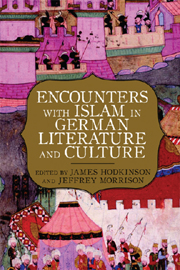Book contents
- Frontmatter
- Contents
- Acknowledgments
- Introduction
- 1 “cristen, ketzer, heiden, jüden”: Questions of Identity in the Middle Ages
- 2 Wolfram von Eschenbach, Islam, and the Crusades
- 3 Perverted Spaces: Boundary Negotiations in Early-Modern Turcica
- 4 Enlightenment Encounters the Islamic and Arabic Worlds: The German “Missing Link” in Said's Orientalist Narrative (Meiners and Herder)
- 5 Goethe, Islam, and the Orient: The Impetus for and Mode of Cultural Encounter in the West-östlicher Divan
- 6 Moving beyond the Binary? Christian-Islamic Encounters and Gender in the Thought and Literature of German Romanticism
- 7 Forms of Encounter with Islam around 1800: The Cases of Johann Hermann von Riedesel and Johann Ludwig Burckhardt
- 8 Displacing Orientalism: Ottoman Jihad, German Imperialism, and the Armenian Genocide
- 9 German-Islamic Literary Interperceptions in Works by Emily Ruete and Emine Sevgi Özdamar
- 10 Dialogues with Islam in the Writings of (Turkish-)German Intellectuals: A Historical Turn?
- 11 Michaela Mihriban Özelsel's Pilgrimage to Mecca: A Journey to Her Inner Self
- 12 Intimacies both Sacred and Profane: Islam in the Work of Emine Sevgi Özdamar, Zafer Şnocak, and Feridun Zaimoğlu
- 13 Encountering Islam at Its Roots: Ilija Trojanow's Zu den heiligen Quellen des Islam
- 14 The Lure of the Loser: On Hans Magnus Enzensberger's Schreckens Männer and Ian Buruma's Murder in Amsterdam
- Notes on the Contributors
- Index
Introduction
Published online by Cambridge University Press: 05 February 2013
- Frontmatter
- Contents
- Acknowledgments
- Introduction
- 1 “cristen, ketzer, heiden, jüden”: Questions of Identity in the Middle Ages
- 2 Wolfram von Eschenbach, Islam, and the Crusades
- 3 Perverted Spaces: Boundary Negotiations in Early-Modern Turcica
- 4 Enlightenment Encounters the Islamic and Arabic Worlds: The German “Missing Link” in Said's Orientalist Narrative (Meiners and Herder)
- 5 Goethe, Islam, and the Orient: The Impetus for and Mode of Cultural Encounter in the West-östlicher Divan
- 6 Moving beyond the Binary? Christian-Islamic Encounters and Gender in the Thought and Literature of German Romanticism
- 7 Forms of Encounter with Islam around 1800: The Cases of Johann Hermann von Riedesel and Johann Ludwig Burckhardt
- 8 Displacing Orientalism: Ottoman Jihad, German Imperialism, and the Armenian Genocide
- 9 German-Islamic Literary Interperceptions in Works by Emily Ruete and Emine Sevgi Özdamar
- 10 Dialogues with Islam in the Writings of (Turkish-)German Intellectuals: A Historical Turn?
- 11 Michaela Mihriban Özelsel's Pilgrimage to Mecca: A Journey to Her Inner Self
- 12 Intimacies both Sacred and Profane: Islam in the Work of Emine Sevgi Özdamar, Zafer Şnocak, and Feridun Zaimoğlu
- 13 Encountering Islam at Its Roots: Ilija Trojanow's Zu den heiligen Quellen des Islam
- 14 The Lure of the Loser: On Hans Magnus Enzensberger's Schreckens Männer and Ian Buruma's Murder in Amsterdam
- Notes on the Contributors
- Index
Summary
THE VOLUME Encounters with Islam in German Literature and Culture developed out of the conference German Encounters with Islam, which took place at the National University of Ireland, Maynooth, in March 2007. The conference raised a number of important issues, issues that not only are interesting in their own right but also seem particularly pertinent, given the prevailing global political — and, sadly, military — situation. The relationship between Europe and the Islamic world once more appears undeniably strained, and so it has become the subject of serious reflection for political, church, and intellectual leaders as well as for the ordinary citizens who find themselves at the troubled interface of two cultures. Yet despite obvious points of geographical, military, and political tension, the model of a fundamental clash of civilizations is as much a product of existing tensions as it is evidence of absolute and insurmountable division between Islam and Europe. Indeed, as the Maynooth conference showed, talk in general of two monolithic cultural blocks, opposed or not, is increasingly inadequate as an approach: contemporary reality is far more complex. Whereas in earlier times any European engagement with Islam would have meant substantially engagement with a remote “Other,” it now involves also looking within at the developing Islamic presence within European culture. Islamic self-definition is likewise increasingly colored by global influences that problematize a simple sense of Islamic self.
The conference illuminated a range of largely germanophone literary and theoretical responses to Islamic culture and revealed important aspects of the dynamics of cultural interaction. The texts discussed were many and varied and included travelogues based on first-hand encounters with Islam; literary, essayistic, and theological writing on Islamic religious practice; texts incorporating characters, situations, or locations from the Islamic world into prose fiction or drama; and writing in German by Muslims, or those of a Muslim background. Each of these categories of writing, of course, revealed as much about the European “home” culture as it did of Islamic culture.
- Type
- Chapter
- Information
- Publisher: Boydell & BrewerPrint publication year: 2009

